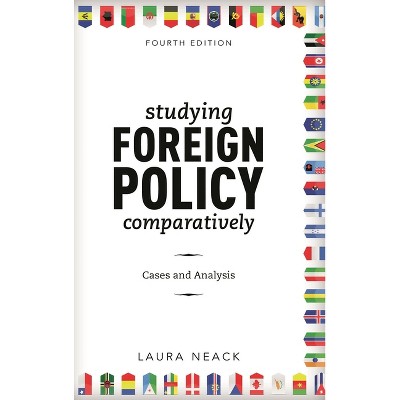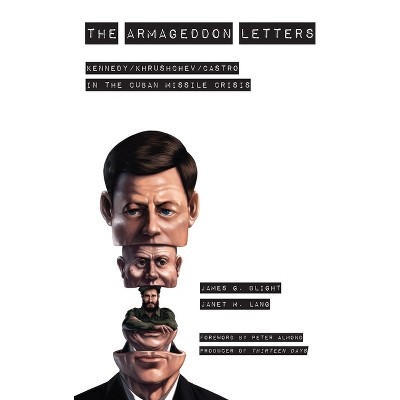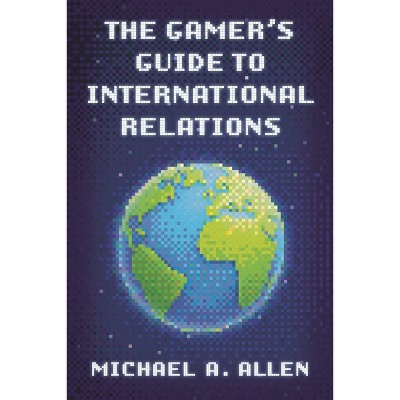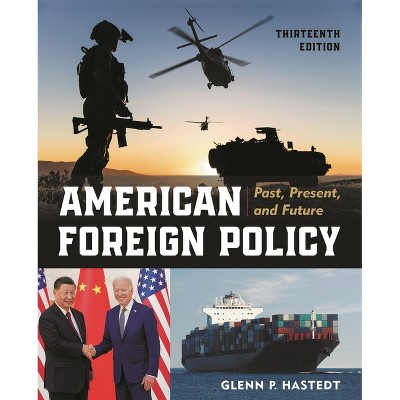Sponsored

International Negotiation in a Complex World - (New Millennium Books in International Studies) 4th Edition (Paperback)
$39.99Save $2.01 (5% off)
In Stock
Eligible for registries and wish lists
Sponsored
About this item
Highlights
- This hands-on text provides an essential introduction to international negotiation, exploring the impact of complex multilateralism on traditional negotiation concepts such as bargaining, issue salience, and strategic choice.
- About the Author: Brigid Starkey is senior lecturer in the Department of Political Science and assistant director of the Global Studies Program at the University of Maryland, Baltimore County.
- 218 Pages
- Political Science, International Relations
- Series Name: New Millennium Books in International Studies
Description
About the Book
This hands-on text provides an essential introduction to international negotiation, exploring the impact of complex multilateralism on traditional negotiation concepts such as bargaining, issue salience, and strategic choice. The authors include a rich array of current real-wo...Book Synopsis
This hands-on text provides an essential introduction to international negotiation, exploring the impact of complex multilateralism on traditional negotiation concepts such as bargaining, issue salience, and strategic choice. The authors include a rich array of current real-world cases and examples--now updated with the results of the Paris climate change agreement--to illustrate key themes.Review Quotes
A welcome addition to the large and growing literature on negotiation. The authors have had a long association with the International Communication and Negotiation Simulation Project (ICONS) at the University of Maryland, and a strong desire to develop an approach to the study of negotiation that is based on simulation exercises, utilizing sophisticated network techniques. Their short book is both substantially rich and a valuable tool for students and policy makers alike.
By adopting a gameboard analogy and drawing on a wide range of recent case examples woven throughout the text, International Negotiation in a Complex World provides an approachable yet rich coverage of negotiation processes. The authors present a clear structural framework for discussing negotiations, incorporating a broad range of applicable literature. This text would fit very well into classes covering negotiation topics ranging from the environment and development to conflict and post-conflict issues.
Despite the importance of international negotiation there are remarkably few texts that can unconditionally be recommended for international relations courses. Professors Starkey, Boyer, and Wilkenfeld are to be congratulated for producing an authoritative introduction to international negotiation that is at once clear, interesting, innovative, and enjoyable. The authors have produced an excellent, user-friendly text for students that brilliantly succeeds in getting across key features of the negotiating process. They cover the major concepts, approaches, and theories in the field in a concise and highly readable way. Their synthesis of case study and theoretical analysis is just what is called for. What particularly impressed me was the ability of the authors to explain the context and mechanics of international negotiation while at the same time placing negotiation exactly where it should be--at the heart of international relations. As well as enthusiastically endorsing the adoption of this fine study as an introduction to international negotiation, I would also wish to recommend it most highly as an essential component of general courses on diplomacy and foreign policy.
Negotiating a Complex World is more than merely 'an introduction to international negotiation.' Starkey, Boyer, and Wilkenfeld have presented a sophisticated framework for understanding international negotiation that will be a valuable tool for students, scholars, and policy makers alike. The authors' Afterword on virtual diplomacy is a timely addition that should be required reading for students and practitioners of the art of diplomacy in the twenty-first century.
Starkey, Boyer, and Wilkenfeld update their textbook and tutorial to incorporate new events and new developments in continuing conflicts during the five years since the first edition. Their approach does not pivot on the case studies, however, but on concepts in negotiation: the board, the players, the stakes, the moves, and outcomes.
The authors use the metaphor of games as a way of understanding the central aspects of international negotiation. [The book] provides a broad overview of the field, without losing its sensitivity to the problems and issues facing different negotiation situations. The theoretical parts are nicely backed by empirical illustrations.
This engaging book moves us to a new era of international relations characterized by global diplomacy, non-state actors, and complex, interlinked issues. Using interesting case examples, the authors bring concepts to life for the practitioner, scholar, and general reader alike. Capturing key ideas in the contemporary literature on negotiation, they show how the changing international context interacts with specific negotiating situations in shaping processes and producing outcomes. The authors' use of a board game metaphor for negotiating processes and strategies enables the reader to appreciate the complexity and uncertainty of negotiation without being mired in technical details. Useful chapter summaries, glossaries, web sites, and references further enhance the book's value.
This excellent text introduces students to the basic concepts, structures, processes, and outcomes involved in international negotiations in the complex global environment in which we live. The authors do an excellent job of presenting the basic components of international negotiation theory in a clear and engaging fashion, while also drawing on the latest scholarly research in a user-friendly manner. One comes away recognizing that negotiated agreements require a mutual ability to forego the optimal for mutually satisfactory terms that meet the fundamental needs and interests of all negotiating parties. Therefore, compromise and creative invention of mutually beneficial formulas that transcend conflicting interests are required in order to achieve joint benefits; achieving these outcomes requires patience, creativity, and a lot of hard work. This text is thus of value for both students approaching the subject for the first time as well as for experienced practitioners who may gain new insights into strategies for negotiating better, fairer, and more durable international agreements on some of the most complex but important issues of our time.
Unique . . . is the emphasis placed on simulations and 'virtual diplomacy, ' including the listing of myriad web sites devoted to negotiation. A well-designed book with many references to contemporary examples of negotiation, it is more appropriate to the beginner than the expert. The bibliography is quite good.
About the Author
Brigid Starkey is senior lecturer in the Department of Political Science and assistant director of the Global Studies Program at the University of Maryland, Baltimore County.
Mark A. Boyer is Board of Trustees Distinguished Professor and director of the Environmental Studies Program at the University of Connecticut.
Jonathan Wilkenfeld is professor in the Department of Government and Politics at the University of Maryland and director of the ICONS Simulation Program.
Dimensions (Overall): 8.8 Inches (H) x 5.9 Inches (W) x .7 Inches (D)
Weight: .7 Pounds
Suggested Age: 22 Years and Up
Number of Pages: 218
Genre: Political Science
Sub-Genre: International Relations
Series Title: New Millennium Books in International Studies
Publisher: Rowman & Littlefield Publishers
Theme: Diplomacy
Format: Paperback
Author: Brigid Starkey & Mark A Boyer & Jonathan Wilkenfeld
Language: English
Street Date: August 22, 2016
TCIN: 1004683155
UPC: 9781442276710
Item Number (DPCI): 247-19-7589
Origin: Made in the USA or Imported
If the item details aren’t accurate or complete, we want to know about it.
Shipping details
Estimated ship dimensions: 0.7 inches length x 5.9 inches width x 8.8 inches height
Estimated ship weight: 0.7 pounds
We regret that this item cannot be shipped to PO Boxes.
This item cannot be shipped to the following locations: American Samoa (see also separate entry under AS), Guam (see also separate entry under GU), Northern Mariana Islands, Puerto Rico (see also separate entry under PR), United States Minor Outlying Islands, Virgin Islands, U.S., APO/FPO
Return details
This item can be returned to any Target store or Target.com.
This item must be returned within 90 days of the date it was purchased in store, shipped, delivered by a Shipt shopper, or made ready for pickup.
See the return policy for complete information.
Trending Non-Fiction

$19.31
was $20.98 New lower price
4 out of 5 stars with 64 ratings

$18.28
was $19.58 New lower price
4.7 out of 5 stars with 17 ratings

$4.59
MSRP $7.99
Buy 2, get 1 free select books
4.8 out of 5 stars with 123 ratings

$6.20
MSRP $10.95
Buy 2, get 1 free select books
4.8 out of 5 stars with 33 ratings

$7.09
MSRP $9.99
Buy 2, get 1 free select books
4.9 out of 5 stars with 46 ratings












